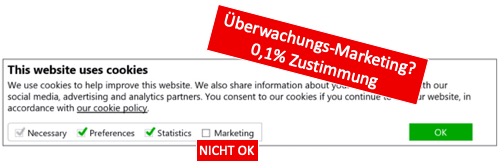“Wir schützen ihre Privatsphäre. Und jetzt nehmen Sie bitte einige Cookies.” So könnte man das Ergebnis der Feldstudie zu Cookie-Layern zusammenfassen, die Informatik-Post-Doc Martin Degeling im November auf unserem Excellence Forum #50 vorstellte. Vom tollen Vortrag des Forschers der Ruhr-Universität Bochum blieb uns vor allem eine Zahl hängen: 0,1%. So viele Onlinenutzer stimmten in empirisch belastbaren Experimenten dem Setzen von Marketing-Cookies zu. Die Zahl bezieht sich auf die willentliche, aktive Zustimmung zu Marketing-Cookies – im Unterschied z.B. zu Statistik-Cookies. Zur Studie „(Un)informierte Zustimmung: Feldstudie zu Zustimmungs-Layern nach DSGVO“ verlinken wir hier gerne (englisch).
User wollen relevante Online-Werbung?
“User wollen relevante Online-Werbung”. Wie oft haben wir das schon gehört seit 1997? Kommunikations- aber auch Propagandaprofis wissen: wenn man Nichtexistierendes und Unwahres nur oft und lang genug in der Kommunikation wiederholt, geht es irgendwann als Tatsache durch und wird geglaubt.
Im Konflikt zwischen Onlinewerbung und Datenschutz läuft es genauso. Seitdem es blinkende Banner-Gifs gibt, wird behauptet, das Problem der fehlenden Akzeptanz und Wirkung von Displaywerbung sei ihr “falscher”, nicht interessanter, nicht passender etc. Inhalt. Stattdessen müsse man nur den “richtigen Inhalt, zum richtigen Zeitpunkt, an den richtigen User usw. usf….”
Aber es ist eben nicht der Inhalt, der vor allem stört. Es ist die spezielle Nutzungssituation im Push Pull-Medium Online, die dafür sorgt, dass Online-Werbung stört. Das ist der grosse Unterschied zum “lean back”-TV-Konsum. Hier stört Werbung weniger. Nicht weil sie “besser”, “targeted” oder “personalisiert” ist. Sondern weil sie im Medium TV, mit seiner spezifischen Nutzungssituation auf der Couch, per se weniger stört.
Online-Werber wollen überwachte User. Die EU nicht.
Der Mythos der “relevanten Werbung” ist für die Online-Werbeindustrie zentral. Denn nur dieses Argument (oder die Argumente von autokratischen Regimes wie China) rechtfertigt eine global flächendeckende, geradezu orwelleske Überwachung aller Nutzer von Smartphones und Onlinediensten. Totale Transparenz – wozu? Davon profitieren nicht nur GAFA (Google, Apple, Facebook, Amazon) sondern auch noch nicht monopolisierte Anzeigenvermarkter, Mediaagenturen und technische Dienstleister hinter der Onlinewerbung.
In der Onlinepraxis bedeutet “relevante Werbung”: Targeting, Performance Marketing, “Precision Marketing” u.v.a.m.
Hinter diesen Begriffen stehen technische Dienste, die personenbezogene Daten erheben und aggregieren. Solche Tätigkeiten, Datensätze und Informationen können jederzeit eingesetzt werden, um die Freiheit eines Staatsbürgers oder aller Staatsbürger einzuschränken. Sie sind potentiell demokratiegefährdend und darum auch seit Inkrafttreten der DSGVO (in europäisch: GDPR) zustimmungspflichtig – von A bis Z. Was es mit der (scheinbar) gemessenen Wirkung auf sich hat, kann man hier lesen.
“Privacy by default”. Und was werden die User dann machen? Nicht zustimmen
Nutzer müssen laut DSGVO dem Einsatz von Cookies “informiert” (!) zustimmen. “Privacy by default”, so lautet die Datenschutz-Grundlage der EU-Gesetze. Kein Setzen von Cookies ohne explizite Zustimmung. Und siehe da, immer mehr Tech-Firmen folgen ihr. Die Standardeinstellung von Mozilla, Safari und bald auch Chrome blockieren Cookies, die nicht von der Website gesetzt werden, die man besucht.
Und wie werden die User auf die neue Situation reagieren? Mit hoher Wahrscheinlichkeit gar nicht. So kann man die Ergebnis von Martin Degelings Studie interpretieren, die Cookie-Layer auf 6759 Websites ebenso untersuchte, wie die Reaktion von 82000 Online-Shoppern auf verschiedene Formen von Cookie-Layern.
Nachtrag zu 0,1%: Die Forscher waren so fair und veröffentlichten auch die Messergebnisse kommerzieller Anbieter zu den Forschungs-Experimenten. Cookiebot meldete 5,6% statt 0,16%. Man kann Online auch ohne Cookies erfolgreich sein. Wir sagen gerne, wie.
